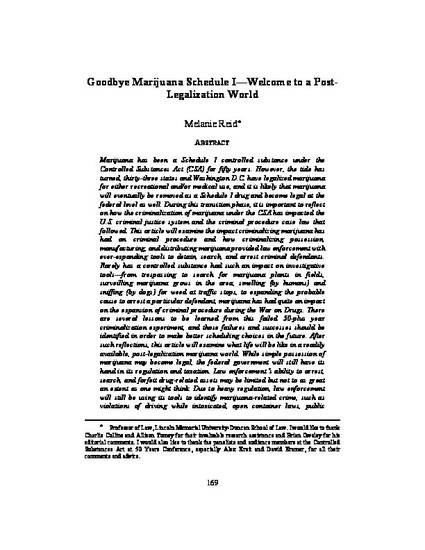
Article
Goodbye Marijuana Schedule I-Welcome to A Post-Legalization World
Ohio State Journal of Criminal Law
(2020)
Abstract
Marijuana has been a Schedule I controlled substance under the Controlled Substances Act (CSA) for fifty years. However, the tide has turned, thirty-three states and Washington D.C. have legalized marijuana for either recreational and/or medical use, and it is likely that marijuana will eventually be removed as a Schedule I drug and become legal at the federal level as well. During this transition phase, it is important to reflect on how the criminalization of marijuana under the CSA has impacted the U.S. criminal justice system and the criminal procedure case law that followed. This article will examine the impact criminalizing marijuana has had on criminal procedure and how criminalizing possession, manufacturing, and distributing marijuana provided law enforcement with ever-expanding tools to detain, search, and arrest criminal defendants. Rarely has a controlled substance had such an impact on investigative tools—from trespassing to search for marijuana plants in fields, surveilling marijuana grows in the area, smelling (by humans) and sniffing (by dogs) for weed at traffic stops, to expanding the probable cause to arrest a particular defendant, marijuana has had quite an impact on the expansion of criminal procedure during the War on Drugs. There are several lessons to be learned from this failed 50-plus year criminalization experiment, and those failures and successes should be identified in order to make better scheduling choices in the future. After such reflections, this article will examine what life will be like in a readily available, post-legalization marijuana world. While simple possession of marijuana may become legal, the federal government will still have its hand in its regulation and taxation. Law enforcement’s ability to arrest, search, and forfeit drug-related assets may be limited but not to as great an extent as one might think. Due to heavy regulation, law enforcement will still be using its tools to identify marijuana-related crime, such as violations of driving while intoxicated, open container laws, public intoxication, minor in possession laws, possession of large amounts of marijuana, etc. The laws and law enforcement activity in states where marijuana has already been decriminalized serve as a guidepost for a post-legalization world. Living in a post-legalization world will require some changes for the law enforcement community and will cause federal agents to shift from criminal investigative work to regulatory action.
Keywords
- marijuana,
- Schedule 1,
- legalization,
- criminal procedure
Disciplines
Publication Date
2020
Citation Information
18 Ohio St. J. Crim. L. 169 (2020).
